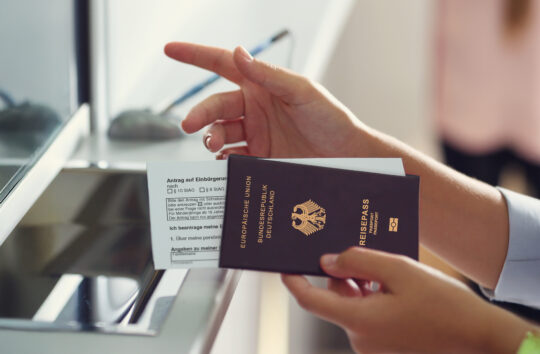What does § 44 AufenthG regulate?
§ Section 44 AufenthG sets out the conditions under which foreign nationals in Germany are entitled to attend an integration course.
This course helps with language and social integration and can pave the way for successful integration into German society. However, not everyone is automatically entitled to participate. We explain who is entitled and what to do if you are not automatically entitled.
Entitlement to § 44 AufenthG
The statutory entitlement to attend an integration course in accordance with Section 44 of the Residence Act is aimed at persons who meet certain requirements:
- Granting of a residence permit: You will receive a residence permit for the first time for the purpose of family reunification or for humanitarian reasons (Sec. 25 (1) or (2), Sec. 25 (4a) Sentence 3 or Sec. 25b AufenthG)
- Permanent residence: It is assumed that you are permanently resident in Germany if your residence permit has been valid for at least one year or if you have held a residence permit for more than 18 months.
If you belong to one of these groups, you are entitled under § 44 AufenthG to take part in a one-off integration course that will prepare you linguistically and culturally for life in Germany.
No automatic authorization - application to the BAMF
Not all people living in Germany automatically have the right to an integration course in accordance with § 44 AufenthG.
The following groups are not entitled to an integration course according to § 44 AufenthG:
- Children, adolescents and young adults who start school education or continue their previous school career in the Federal Republic of Germany
- If the person's need for integration is recognizably low
- If the foreigner already has sufficient knowledge of the German language.
For EU citizens or persons who are not directly entitled to the course according to § 44 AufenthG, there is still the possibility of submitting an application to the Federal Office for Migration and Refugees (BAMF). In this case, you must provide proof of your special need for integration in order to be admitted to the course.
This regulation pursuant to Section 44 (4) AufenthG applies to the following persons:
- People who have a residence permit
- People who have a Tolerance permit in accordance with Section 60a (2) sentence 3
- People in possession of a residence permit pursuant to Section 24 AufenthG or Section 25 (5) AufenthG
With regard to the duration of the entitlement, there is a rule laid down in Section 44 (2) sentences 1 and 2 AufenthG:
Quote from the legal text in § 44 AufenthG paragraph 2 sentence 1 and sentence 2: "The entitlement to participate in accordance with paragraph 1 shall expire one year after the residence title on which the entitlement is based has been issued or has lapsed. This does not apply if the foreigner has not been able to register for an integration course by this time for reasons for which he/she is not responsible."

§ Section 44a AufenthG - Obligation to participate in an integration course
While Section 44 AufenthG regulates the right to attend an integration course, Section 44a AufenthG deals with the obligation to attend such a course. In certain cases, foreigners in Germany are obliged to attend an integration course in order to improve their German language skills and integrate better into society. Here you can find out who is obliged to attend and what exceptions there are.
Who is obliged to participate?
The obligation to take part in an integration course comes into force if certain requirements are met. The following groups of people are obliged to participate:
- Language skills: Persons who cannot communicate in German in at least a simple manner.
- Residence permit: Foreigners who have received a Residence permit for the first time in accordance with Section 23 (2) AufenthG, Section 28 (1) AufenthG, Section 30 AufenthG or Section 36a (1) sentence 1 first alternative AufenthG and do not have sufficient language skills.
- Benefits according to SGB II: Anyone receiving benefits in accordance with Book II of the Social Code (SGB II) may also be obliged to participate by Foreigners' office in accordance with Section 15 (5) sentence 2 or (6) of Book II of the Social Code if there is a particular need for integration.
- Persons with special integration needs: In this case, Foreigners' office decides on a case-by-case basis whether participation is necessary.
The role of Foreigners' office and the BAMF is crucial in this context. The Foreigners' office determines whether you are obliged to participate and informs you accordingly. If you are obliged to participate, you will receive a corresponding request to do so.
Exemption from the obligation to participate
However, there are also exceptions to the obligation to attend. Not all people are obliged to attend an integration course. The most important exceptions are
- Pupils and trainees: If you are in school or vocational training, you are exempt from the obligation.
- Proof of comparable educational programs: If you have already taken part in comparable educational measures that impart the necessary language and cultural skills, you are not required to take part in the orientation course
- Unreasonable participation: If participation in the integration course is permanently impossible or unreasonable, for example for health reasons or due to family obligations, you can be exempted from participation.
It is important that you take the request from Foreigners' office seriously, as failure to do so may have consequences that could affect your Residence permit .
Difference between integration course and naturalization test
Many people confuse the integration course with the naturalization test, as both appear similar at first glance. However, there are important differences. While the integration course primarily serves the purpose of linguistic and cultural integration, the naturalization test is an official requirement for obtaining German citizenship.
In this section, we explain how the two differ and whether you need the integration course for your Naturalization .
The naturalization test as a prerequisite for Naturalization
In order to obtain German citizenship, you must pass the so-called naturalization test, which is carried out at BAMF test centres. This test, also known as the "Test Leben in Deutschland", is part of the formal requirements for Naturalization.
Examination content and procedure:
- The test comprises 33 questions on political, legal and historical topics in Germany.
- You have 60 minutes to complete the test.
- At least 17 of the 33 questions must be answered correctly to pass the test.
The content of the naturalization test is clearly different from the topics covered in the integration course, which focuses primarily on everyday life in Germany and the teaching of language skills. The "Living in Germany" test is therefore less focused on learning German and more on testing your knowledge of German society, culture and politics.
Content of the integration course
The integration test has the following contents:
- Getting to know everyday life: During the integration course, you will learn about everyday situations such as visiting the authorities and writing emails.
- Practicing job applications: You will learn how to write CVs and conduct job interviews so that your professional integration is successful.
- Language course: You have a language course that includes 600 lessons.
- Orientation course: You have an orientation course of 100 hours.
ATTENTION: The integration course is not compulsory for Naturalization. With a few exceptions, it is voluntary. However, the course helps you to prepare for the naturalization test and to prove your willingness to integrate. The more integration achievements and participation in the integration course you can prove, the easier it will be for you at Naturalization!
Do I need the integration course for Naturalization?
A common misconception is that attending an integration course is compulsory for Naturalization . In fact, this is not the case. The § 10 StAG (Citizenship Act) regulates the requirements for Naturalization, and the naturalization test plays a central role in this.
Requirements for Naturalization according to § 10 StAG:
- Legal residence in Germany for at least 5 years (3 years for C1 certificate and special integration achievements).
- Passed naturalization test or corresponding proof of knowledge in the area of "Life in Germany".
- Language level B1 or higher according to the Common European Framework of Reference for Languages (CEFR).
- Signed declaration of loyalty and commitment to the free democratic basic order
- Securing a livelihood for you and your family
- Clarification of identity
Participation in the integration course is not a mandatory requirement for Naturalization unless you need the course to achieve the required language level. If you already have sufficient knowledge of German, you can register directly for the naturalization test and do not need the integration course. Nevertheless, the integration course is a great help as preparation for the Naturalization and helps as proof of integration!
Difficulties with Naturalization?
Conclusion on Section 44 AufenthG
As you can see, the topic of § 44 AufenthG authorization to participate in an integration course is very diverse. We have summarized the most important points for you here and added important points for the application.
Importance of integration courses in the context of residence law
The integration courses in accordance with § 44 and § 44a AufenthG are key instruments for the linguistic and cultural integration of foreigners in Germany. While Section 44 regulates the entitlement to participation for certain groups, such as employed persons, family members and persons admitted on humanitarian grounds, Section 44a goes one step further and describes the obligation to participate for persons with special integration needs.
- Benefits for participants: The course improves your German language skills and helps you to integrate better in everyday and professional life. In addition, the integration course provides you with an integration achievement. This will help you with your naturalization application!
- Obligations under Section 44a: Anyone who is obliged to participate must complete the course in order to avoid negative effects on Residence permit .
Important points when applying for and participating in the integration course
Applying for an integration course at the BAMF is the first step for many people who do not have an automatic entitlement. Here are the most important points:
- Application: Submit the application directly to the BAMF.
- Admission: Wait for confirmation of your admission.
- Course start: As soon as you are admitted, you can start the course and benefit from the content that will help you find your way around Germany.

This guide is specially designed for those who are already deeply integrated into German society due to their education or life circumstances and would like to take advantage of a simplified Naturalization . Here you can find out which criteria must be met in order to be exempt from the test requirement.
In principle, people who have received a residence permit for the first time and wish to stay in Germany permanently may take part in the integration course. This includes
According to § 44a AufenthG, foreigners are obliged to take part in an integration course if they:
- Do not have sufficient knowledge of German,
- Receive a Residence permit for family reunification, subsidiary protection or for humanitarian reasons,
- receive benefits under the Social Security Code II and the authority asks them to participate.
No, the integration course is not a direct requirement for Naturalization. However, you must pass the "Living in Germany" naturalization test and provide proof of sufficient German language skills (B1 level), which you can also achieve without the integration course.
If you already have sufficient knowledge of German or have taken part in other comparable educational measures, you can be exempted from attending the integration course. Language schools and private educational institutions also offer alternative language and orientation courses.
No, the integration course and the naturalization test are two different measures. The integration course teaches German language skills and cultural basics, while the naturalization test deals with political, historical and legal questions about Germany. However, both are important steps towards integration.
The integration course consists of two main parts:
- Language course: 600 hours to learn German (up to B1 level).
- Orientation course: 100 hours to impart knowledge about the German legal system, culture and history.
If you are not automatically entitled to an integration course, you can submit an application for admission to the BAMF. The application includes:
- Fill out the application form,
- Enclose the necessary documents (e.g. Residence permit),
- Submission to the BAMF,
- Processing time and subsequent decision on admission. If the application is approved, you can select a course provider and start the course.








